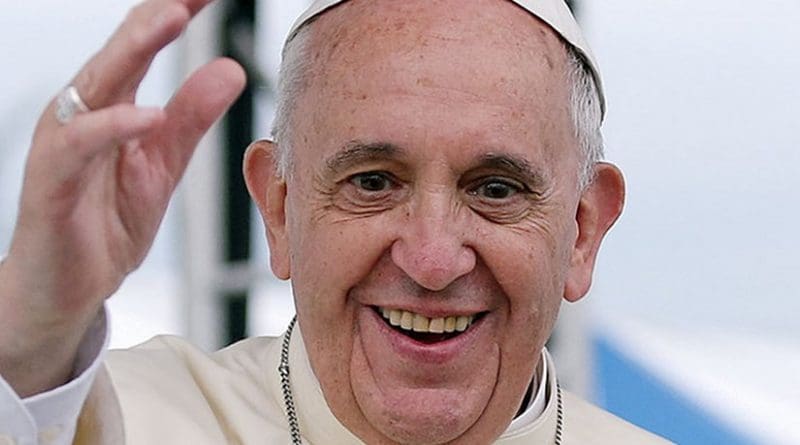Pope Says Christian-Muslim Dialogue Essential For Global Peace – OpEd
Pope Francis said dialogue between religions in Africa was essential to teach young people that violence and hate in God’s name was unjustified, speaking in Kenya which has been the victim of a spate of militant massacres.
Addressing the Christian and Muslim leaders in Kenya on November 26 Pope Francis told that they have little choice but to engage in dialogue to guard against the “barbarous” extremist attacks that have struck Kenya recently, saying religious leaders must be “prophets of peace” in a world sown by hatred.
On his first full day in Africa, Pope Francis insisted that religion can never be used to justify violence and lamented that “all too often, young people are being radicalized in the name of religion to sow discord and fear, and to tear at the very fabric of our societies.” He said interfaith dialogue isn’t a luxury or optional, but is simply “essential.”
Pope Francis made the comments in a meeting with Kenyan Christian, Muslim and other faith leaders at the start of a busy day that will also see him celebrate Mass on a rain-soaked university campus and deliver a major environment speech to the UN regional headquarters in Nairobi.
Kenya, a former British colony is majority Christian, but Muslims represent about 10 per cent of the population. In his remarks, Pope Francis referred explicitly to three recent attacks claimed by the Somalia-based al-Shabab extremist group in fight with Christian militias, saying he knew well that the memories were still fresh in Kenya’s mind.
Bridging divisions between Muslims and Christians is a main theme of his first tour of the continent that also takes him to Uganda, which like Kenya has been victim of terror attacks, and the Central African Republic, riven by sectarian conflict. “All too often, young people are being radicalized in the name of religion to sow discord and fear, and to tear at the very fabric of our societies,” the pope told Muslim and other religious leaders gathered in the Kenyan capital Nairobi. ” It is not something extra or optional, but essential,” he said at a meeting with about 25 religious leaders in the Vatican embassy. He stressed that God’s name “must never be misused to justify hatred and violence.”
In April, the so-called Al-Qaeda linked Al-Shabab apparently claimed responsibility for the attack on a mostly Christian college in northeastern Kenya that left some 150 people dead. A month earlier, Al-Shabab also seemed to have claimed responsibility for attacks in Mandera county on the Somali border in which 12 people died. In September 2013, at least 67 people were killed in an attack by al-Shabab on the Westgate mall in Nairobi.
Al-Shabab opposes Kenya’s decision to send troops to Somalia to fight the group as part of an African Union force backing Somalia’s weak federal government. “Here, I think of the importance of our common conviction that the God whom we seek to serve is a God of peace,” Francis said. “How important it is that we be seen as prophets of peace, peacemakers who invite others to live in peace, harmony and mutual respect.”
The chairman of the Supreme Council of Kenya Muslims (Supreme), Abdulghafur El-Busaidy, also called for cooperation and tolerance. He said Christians and Muslims must work together to accommodate one another, and lead the country. “We have to lead, because we are led by the word of God. “As people of one God and of this world we must stand up and in unison, clasp hands together in all the things that are essential for our collective progress,” he said at the meeting, adding doctrinal differences should be put aside.
Thousands of police officers, some mounted on horses, were deployed in Nairobi to protect the pope and control the crowds. The most hazardous stop may be the Central African Republic, where dozens of people have been killed since September in violence between mostly Muslim Selena rebels and Christian anti-balaka militias. The pope has brushed off safety concerns.
Later, the pope visited the regional UN headquarters in Nairobi.
The pope’s tour seeks to address the continent’s fast-growing Catholic population, with the number of African Catholics expected to reach half a billion by 2050. A third of Kenya’s 45 million people are Catholics and tens of thousands of them gathered in pouring rain to attend the pope’s open-air Mass in central Nairobi later on Thursday.
Like the so-called human right activist and Nobel prize winner Aung San Suu Kyi for peace from Burma,the Pope never condemned Israeli/Jewish attacks on the besieged Palestinians in Gaza Strip or continued brutal occupation of Palestinians lands by Israeli government or raised his valuable voice against Indian brutalities in its occupied Jammu Kashmir, already killing over 100 000 Kashmiri Muslims by Indian military boys. Like the USA, Pope is also very selective in praising or condemning certain contemporary occurrences. Pope should have voiced his concern about continuing terror wars of USA and Nato. US-NATO forces have killed millions of Muslims by calling them all so-called “terrorists” after occupying their nations.
Pope Francis, a highly revered spiritual leader not just for Christians, but the entire world, is expected to be neutral in his comments. The world should not be allowed to suspect the spiritual authority of Pope by reading or listening to his oft anti-Islamic tirades. Double-speaks and double-standards are not good for him.

